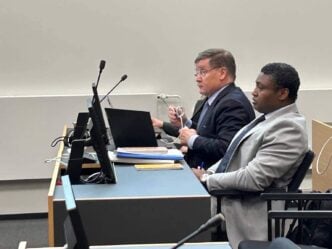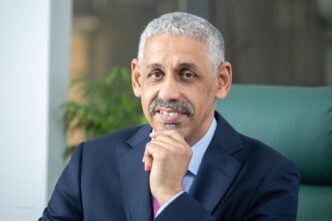Capturing of Abuja nomadic children during NCNE survey in July 2025 | Credits: Samuel Adebanjo
Nigeria’s education ministry says a series of data-driven intervention programmes are underway to improve basic education access for nomadic populations in the country.
Balarabe Shehu-Kakale, special adviser to the education minister on out-of-school children, said the interventions are also intended to have positive ripple effects for Nigeria’s livestock and cropping value chains.
The SA spoke to TheCable about the ministry’s recently initiated nationwide census intended to identify and document out-of-school nomads and other educationally disadvantaged groups.
The six-phase survey, which had its pilot run in July 2025, extends to roaming Almajiri children in Nigeria’s six geopolitical zones.
Advertisement
The project, the ministry had said, will particularly profile nomadic children, geolocate their communities, and determine where learning centres or teachers are needed for onward intervention.
Among the key partners in the census are the National Commission for Nomadic Education, the Universal Basic Education Board, the National Identity Management Commission, and the National Bureau of Statistics.
The project also includes the National Commission for Mass Literacy, Adult, and Non-Formal Education, as well as the National Commission for Almajiri Education and Out-of-School Children.
Advertisement
Shehu-Kakale said the education ministry, after extensive meetings with the nomadic education commission, plans to resettle semi-nomadic populations and enrol their children in functional basic schools.
A report, published in April 2025, documented the educational deprivation affecting nomadic children across northern and southern Nigeria.
The story reported the basic school enrollment rate of Nigeria’s nomads to be at an annual average of 1.8 million, with an estimated 5 million children left to idle around in huts, among cattle, and on farms all day on the remote margins of society.
It demonstrated how enduring insecurity threats disrupt already struggling nomadic schools in the country’s far north, resulting in a shortage of instructors and a student-teacher ratio of 91:1 as against UNESCO‘s recommended 40:1.
Advertisement
The report also highlighted cultural barriers, teacher attrition, infrastructure gaps, and legislation among the factors impeding basic school enrollment for nomads.
Shehu-Kakale cited the adaptation of an accelerated basic education programme (ABEP) and its plans to deploy digital literacy for nomads, acknowledging that not all learning must happen in the classroom.
“We will train facilitators. With just a computer, a projector, and a solar power source, they can deliver education,” he said.
The special adviser said the ministers of agriculture and the minister of livestock met with the education minister to discuss collaborating on school enrolment for migrant farmers, fishers, and pastoralists.
Advertisement
“Nigeria imports milk in billions of dollars annually. And we have cows here, between 20 and 30 million,” Shehu-Kakale added.
“These ministers are watching what the education ministry is doing for migrant street children. They’re trying to see how these engagements can translate into productivity in the agricultural sector.
Advertisement
“We’re trying to align our education with industry demands in agriculture through our specialised colleges and universities with an integration system that will benefit pastoral production.”
Nigeria’s livestock sector is estimated to be worth N33 trillion but contributes less than three per cent to the annual GDP, with 82 per cent of outputs attributed to nomadic pastoralists.
Advertisement
Stakeholders say the hurdles for pastoral production include farmer-herder clashes, weak conflict resolution mechanisms, and inadequate skill-based education targeted at enhancing the value chain.
Bashir Usman, executive secretary at the National Commission for Nomadic Education, said the agency’s pursuit of a re-enactment bill will empower it to run mobile schools and independently hire teachers.
Advertisement
The NCNE, he added, plans to begin teaching its conflict resolution curriculum on a soon-to-launch radio station, a medium he said up to 95 per cent of nomadic populations rely on for information.
“It’s an AM radio that will cover the whole nation and neighbouring states. It will broadcast in four languages, including English, Pidgin, Hausa, and Fulfulde.
“We have state-of-the-art studios. We have programmes. We have a curriculum that we will continue broadcasting to assist learning outside the classroom.”
This way, Usman echoed, Nigeria can prevent farmer-herder conflicts to boost cropping and livestock production.














